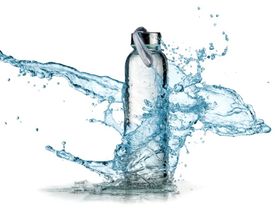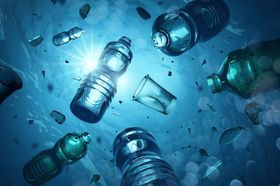7 Best Bottled Water to Drink: Hydrate Consciously
Is bottled better? Dive into the world of bottled water and learn how to choose wisely.
Updated February 3, 2025

The bottled water industry is a multi-billion dollar business that preys on our fears about tap water safety while contributing enormously to plastic pollution. With countless brands claiming to offer the purest, most refreshing water imaginable, it's impossible for consumers to separate fact from fiction.
Meanwhile, the environmental toll is staggering—over 60 million plastic bottles end up in landfills and oceans every day. We've rigorously evaluated major bottled water brands on criteria like source, purification methods, transparency, taste, and environmental impact.
From our review, several brands emerged as offering what may actually be the safest, best-tasting, and most ethically sound bottled waters on the market today.
Top Bottled Water Brands
- Best bottled spring water - Acqua Panna
- Best high pH bottled water - Essentia
- Best soft-tasting bottled water - Fiji
- Best naturally filtered bottled water- Icelandic Glacial
- Best local bottled spring water - Arrowhead
- Best crisp-tasting bottled water - Voss
- Best distilled bottled water - Glaceau SmartWater
Demystifying Bottled Water Choices
Staying hydrated is essential, especially in hot weather or during exercise. Bottled water is a convenient solution for these situations, but choosing the right one can be tricky with so many varieties available.
Here are some factors to consider:
- Taste: The spring bottled water has minerals that give it a unique flavor, while purified alternatives taste neutral due to filtration. pH may also influence the taste, with acidity being sour, and alkaline leaning sweat or soapy.
- Mineral Content: Based on the source, the mineral content varies. On the other hand, purified water typically has a minimal amount because it undergoes cleaning.
- Sodium Content: Levels of this mineral in the spring bottled water may vary, while purified water is typically low in it.
- Material: Glass bottles are a reusable option with minimal taste impact but can be heavier and more prone to breakage. Plastic is more durable but can affect the flavor, quality, and health because it leaches microplastics into the water.
- Certification: You should look for bottles with a certification from a reputable regulatory body that ensures the water has met strict safety standards for consumption. In the US, the National Sanitation Foundation International certifies bottled water.
- Brand Reputation: Research the brand's reputation for quality and ethical practices. This includes their water sourcing, environmental initiatives, and overall commitment to providing safe and high-quality bottled water.
The Hidden Cost of Convenience
While bottled water offers convenience, especially on the go, there's a growing concern about its impact on the planet and human health.
Impact on Health
Water is essential for our well-being, regulating body temperature, flushing toxins, and keeping our organs functioning properly. Consumers are increasingly aware of this, but growing concerns exist about the potential health risks associated with bottled water, particularly plastic bottles.
Though marketed as safer, BPA-free plastic may still leach microplastics—tiny plastic particles less than 5 millimeters in size—and other chemicals. These tiny particles and chemicals can disrupt hormones, harm gut health, and potentially increase cancer risk.
Sustainability Concerns
While glass offers a clear advantage over plastic regarding microplastic leaching, it's not without its environmental drawbacks. The heavier weight of glass bottles translates to a larger carbon footprint, especially when they're shipped long distances.
While beneficial, glass recycling isn't a perfect solution. The process consumes energy, and not all glass is recycled effectively, potentially ending up in landfills or contaminating other recyclables.
Beyond the Bottle: Why Tap Water Wins
Drinking tap water is a cost-effective and eco-friendly way to stay hydrated. You avoid the environmental impact of plastic bottles and the potential for microplastic contamination. Plus, while most municipal tap water is safe to drink, filtration can further enhance its taste and quality.
If you are concerned about the quality of your local tap water, research your local water source. Most municipalities have water quality reports that contain the mineral content, potential contaminants, and any past concerns, like lead. This can help you decide whether to invest in a water purifier.
It's important to note that not all filtration systems are created equal. Consider your needs and budget when choosing a filter, such as a pitcher filter, countertop unit, or whole-house system.
While some select bottled water for its mineral content, adequately filtered tap water provides sufficient hydration for most individuals. For those concerned about not getting enough minerals, there are simple and effective options for boosting your mineral content.
MAYU's Essentials Drops are a natural solution for those seeking improved hydration, immune function, bone health, muscle function, and reduced fatigue. These electrolyte-rich drops address mineral imbalances and enhance plain water at home, all without artificial ingredients.
The Case for Ditching Bottled Water
For many, the convenience of bottled water comes at a hidden cost. The health risks and environmental impacts associated with plastic bottles are becoming increasingly apparent. Luckily, there are readily available alternatives that are more cost-effective, healthier, and sustainable.
MAYU glass bottles combine functionality with sleek design, making them stand out. Crafted from premium Borosilicate glass, known for its durability and temperature resistance, they are a wise investment.
You can pair your bottle with filtered tap water and MAYU's Essential drops to customize the taste and mineral content. This eco-friendly approach minimizes environmental impact while maximizing convenience.





































































